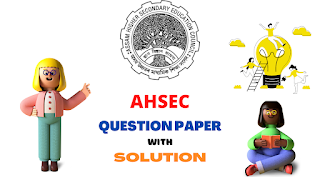AHSEC| CLASS 11| POLITICAL SCIENCE| SOLVED PAPER - 2016| H.S.1ST YEAR
2016
POLITICAL SCIENCE
Full Marks: 100
Time: 3 hours
The figures in the margin indicate full marks for the questions
PART – A
(Indian Constitution at Work)
1. Answer the following questions as directed: 1x6=6
a)
Which
Article of the Constitution declares India as ‘Union of States’?
Ans:- Article 1 of the Constitution declares India as ‘Union of States’.
b)
Who
was the Chairman of the Drafting Committee of the Constitution in India?
Ans:- Dr. Bhim Rao Ambedkar.
c)
In
which Part of the Constitution of India are the Directive Principles of State
Policy included?
Ans:- Part IV of the Constitution of India are the Directive Principles of State Policy include.
d)
The
Fundamental Rights are integral part of the Constitution of India. (Write Yes or No).
e) The basis of ‘Universal Audit Franchise’ is age / education / property. (Choose the correct answer)
f)
Is
every citizen a voter?
Ans:- No every citizen is a voter.
2. Mention two unitary features of the
Indian Constitution. 2
Ans:- Two federal features of Indian Constitution are given below:
(i) Fundamental Rights: - Under its Part III, the Constitution of India guarantees six fundamental rights to its citizens.
(ii) Fundamental Duties: - Under Article 4A of the Constitution, Article 51A enumerates 10 fundamental duties for a citizen of India.
3. Write two fundamental duties of the
Indian citizens. 2
Ans: - Two fundamental duties of Indian citizens: -
(i) To follow the Constitution and respect its ideals and institutions, the national flag and the national anthem.
(ii) To cherish the noble ideals that inspired our national struggle for independence.
4. How many members can be
nominated to the Lok Sabha? From which community such members are
nominated? 2
Ans:- The members of Rajya Sabha are indirectly elected by the members of the state legislatures through the proportional representation-single transferable vote system. Legislative assembly elections are delegated by the constitution of each state. The President nominates a total of 12 members. Those who have achieved distinction in the fields of arts, science, literature and social service.
5. Mention any two
qualifications prescribed for the members of the Rajya Sabha. 2
Ans:- The two qualifications prescribed for the members of the Rajya
Sabha:-
(i) He must be a citizen
of India.
(ii) He should be a
parliamentary elector in the state from where he is seeking election.
6. Who appoints the Chief
Justice of the Supreme Court? What is the term of office of the Chief
Justice? 2
Ans:- The Chief Justice of the Supreme Court is appointed by the
President of India and the tenure of the Chief Justice is 5 years.
7. Write two limitations
of the Constitution of India. 2
Ans:- Two limitations of the Constitution of India: -
(a) Under Article 368 of the Constitution, there is no provision for
a joint sitting of the Houses of Parliament for the Constitution Amendment
Bills as Article 368 of the Constitution specifically requires each House to
pass the Bill by a special majority.
(b) Amendments can be introduced in any House of Parliament by
introducing only one Bill.
8. Explain the advisory
jurisdiction of the Supreme Court of India.
4
Ans:- Article 143 of the Constitution of India depends on the
advisory jurisdiction of the Supreme Court. The President may seek the opinion
of the Supreme Court on any question of law or public importance on which he
considers receiving such a vote.
9. Mention any four weaknesses of the electoral system of India. 4
Ans:- Four weaknesses of India's electoral system: -
(a) Misuse of Mass
Media: During elections, the ruling party uses and programs various mediums of
mass media-radio, television and newspapers etc. to propagate its policies.
(b) Low voting
percentage: In India, many voters do not vote to their voters. The voting
percentage is usually around 50 to 60 percent. Therefore, representative bodies
are not really representative.
(c) Delay in
disposal of election petitions: In India, disposal of election petitions takes
a long time and sometimes the very purpose of election petitions is defeated.
(d) Use of caste
and religion in elections: In India, a large number of votes are cast on the
basis of caste and religion. As a result people get divided on the basis of
caste, religion and community which is very harmful for national unity.
10. Mention four special circumstances under which the Parliament
can legislate over State subjects. 4
Ans:- In some situations, Parliament can legislate on the subjects
of the state.
(a) According to
Art. 249 of the Constitution, if the Rajya Sabha passes any subject of the
state with 2/3 majority and for the present and qualified electors of the
House, the Parliament shall have the power to legislate on that subject which
Is declared national. It can be applied for one year. If Rajya Sabha wishes,
the period of one year can be extended by one more year.
(b) According to
the 7th Schedule of the Constitution, Parliament makes laws. If in any way the
states are related to this law or any state has applied the law on the same
subject, then the law will be made by the Parliament.
(c) According to Art. 353 of the Constitution, if an emergency is declared, in whole or in part of the country (Art. 352 (1)) then Parliament has the power to make laws on the subjects mentioned in all the lists, including the State List is the state list is like this the whole country or a part of it.
(Buy E-Books to read complete solutions)
DOWNLOAD [PAGE LINK:-CLICK HERE]
***
POLITICAL SCIENCE SOLVED PAPERS PAGE LINK - Click here
BUY E-BOOK (PDF FILE)
[TO SEE FULL SOLUTION]
(Chapter wise Notes, Exam Question Papers solved, MCQ solved) [ARTS, COMMERCE, SCIENCE]
|
DOWNLOAD PAGE LINK:-CLICK HERE |
AHSEC PAGE LINK - CLICK HERE
Also Read:

